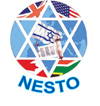The OU’s Home Away from Home: A Place for Teenage Olim
 With American aliyah on the rise, a growing number of English-speaking teenagers are facing difficulties adjusting to Israeli society. In some cases, the inability to adjust socially, academically or emotionally can lead to frustration and depression, and sometimes even to drug and alcohol use.
With American aliyah on the rise, a growing number of English-speaking teenagers are facing difficulties adjusting to Israeli society. In some cases, the inability to adjust socially, academically or emotionally can lead to frustration and depression, and sometimes even to drug and alcohol use.
Responding to this need, the Orthodox Union (OU) created a place where teenage olim could meet with peers who “speak their language” in a wholesome, enjoyable setting.
Housed in the Seymour J. Abrams Orthodox Union Jerusalem World Center, NESTO (Native English-Speaking Teen Olim) offers a drop-in center for former Americans, South Africans, Australians, Canadians and Brits. The center is equipped with computers, bean bag chairs and ping pong tables. “These teens feel like outsiders,” says Sarra Horwitz, assistant director of NESTO, who is an American oleh and a former NCSY advisor. “It’s very hard to leave friends and family. They have problems making friends in school and [fitting into the Israeli] culture. We provide them with a place where they feel at home.”
NESTO draws dozens of teens each week, who participate in educational and recreational group activities including tiyulim (trips), sports, chesed projects and Shabbatonim. “Friends bring friends,” says Horwitz. “We conduct team-building exercises to show how each individual’s strengths are integral to meeting a group goal.” NESTO also invites lecturers to speak about Jewish-related topics and issues related to self-esteem.
Because of the language barrier, many English-speaking teens find that high school presents not only social, but also academic hurdles. “Many were good students in America,” says Horwitz. “Here they are average or below.” In order to graduate, every Israeli high school student is required to take the bagrut (an exam) in Hebrew. To alleviate the scholastic stress, some families decide to home-school their teenagers and have them take the American SAT instead. “The problem with [being home-schooled] is that [the kids] don’t develop social skills,” says Chaim Pelzner, the Israeli-born NESTO director who holds a master’s in education from Bar-Ilan University and worked for the OU’s Joseph K. Miller Torah Center in Kharkov, Ukraine. NESTO is helping these youth deal with the academic stress through NESCHOOL, a program that matches Israeli student tutors with NESTO members. The tutors help them with daily homework assignments while strengthening their Hebrew skills and knowledge.
Best of all, NESTO works. Horwitz tells the story of a girl who wanted to move back to America so she would “not have any problems.” She didn’t want to learn Hebrew or make Israeli friends. But lately, thanks to her experience with NESTO, she’s changed her tune. “She’s been coming in with Hebrew words she’s been learning and asking me questions on [Hebrew] grammar,” says Horwitz. “NESTO helps these teens find their own footing so that they can move on,” she says.
The NESTO staff maintains contact with its “graduates” after they complete high school and go on to yeshivah or the army or to join the Israeli workforce. “They know they can call on us if they need to,” says Pelzner. “It’s still their home away from home.”
Bayla Sheva Brenner is senior writer in the OU Communications and Marketing Department.
